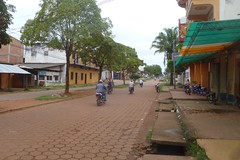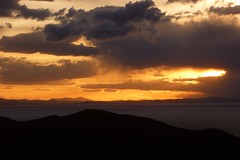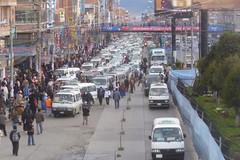News: Bolivian police intervene in indigenous TIPNIS march
25 September 2011
Dario Kenner, La Paz
Facebook Page: http://www.facebook.com/BoliviaDiary
Daily updates on TIPNIS conflict at Twitter: @dariokenner
You can view all updates here http://twitter.com/#!/dariokenner
Five hundred riot police intervened in an indigenous march at 17:15 firing tear gas and rubber bullets near to the town of Yucumo – where the Amazon meets the tropical valleys in north central Bolivia. Among the estimated 800 marchers who were resting when the police arrived were elderly people, pregnant women and children. The final number of injured is still unknown and an estimated seven children who escaped the police action are missing.
“Hundreds of police surrounded us for forty five minutes. We told them to go. Then they started tear gassing us and firing bullets everywhere. They just didn´t care what happened”, said Walberto Baraona of highland indigenous movement CONAMAQ in a phone call.
Since 15 August Bolivia´s indigenous peoples have marched against the plan by the government of President Evo Morales to build a highway through the middle of a national park that is also a recognised autonomous indigenous territory called TIPNIS (Isiboro Sécure National Park and Indigenous Territory) – background information here.
The indigenous communities inside the TIPNIS national park are angry because they were not consulted prior to beginning of construction of the road and because it will lead to environmental damage threatening their way of life. The Bolivian government argues the road is crucial for integration and the development of the country.
According to TV channel PAT and Radio Erbol young people and women were beaten. The marchers’ camp was totally destroyed. Indigenous leaders present at the scene confirmed by phone that hundreds of the marchers were separated into men, women and children. They were then aggressively forced on to coaches. Mothers and their children were split up.
In a Bolivian government press release Deputy Commander Óscar Muñoz, who is in charge of the operation, said the police intervened because indigenous marchers surrounded and threatened them with bows and arrows. He confirmed the police used tear gas and rubber bullets, and reported fifteen people were injured, the majority of them police.
The government says it put between 450 and 650 marchers on to coaches to take them to the town of Trinidad from where they could return to their communities. But the coaches were forced to turn back by a blockade in San Borja in support of the TIPNIS march. Unconfirmed reports say they are on their way to the town of Caranavi. One of the leaders held on a coach Tania Suarez said, “We think we are going to Trinidad but are not sure. We do not know where our people are,” in an interview with Radio Erbol.
There are separate reports that some indigenous marches who escaped the police intervention are hiding in a church in San Borja.
“We are defending our rights as indigenous peoples. Our President has humiliated us. We have suffered the same repression in the past and now we suffer it again. The indigenous peoples of the lowlands will not renounce our rights”, said Nelly Romero, Vice President of CIDOB – the indigenous movement representing Amazonian peoples.
Fernando Vargas, President of the TIPNIS Subcentral representing the indigenous communities inside the national park (see video) and Celso Padilla, President of the Guarani Peoples Assembly, were detained.
Other key leaders on the march including Adolfo Chávez, head of CIDOB, and Mallku Rafael Quispe of CONAMAQ managed to escape. They are determined to continue the march towards La Paz to pressure the Bolivian government not to build the road through the TIPNIS national park.
In an interview with Radio Erbol Mallku Rafael Quispe said, “We had information this would happen yesterday. But we thought this is an indigenous President and an indigenous Foreign Minister so we did nothing”.
The intervention by the police comes a day after Foreign Minister David Choquehuanca and Vice Minister for Coordination of Social Movements César Navarro were forced by the indigenous marchers to lead their march past three police blocks. The Bolivian government condemned the temporary “kidnapping” of Choquehuanca and Navarro whilst the indigenous leaders maintain they “accompanied” the march – both are now back in La Paz.
The reaction to today´s violence is one of shock. Currently protests condemning the police action are breaking out across the country. In central La Paz an estimated six hundred people are holding a vigil in San Francisco square. There are similar protests in Cochabamba and Santa Cruz. More protests are planned in La Paz for Wednesday 28 September by the trade union confederation following a protest on Friday 23 September in support of the TIPNIS march.
Comments
11 Responses to “News: Bolivian police intervene in indigenous TIPNIS march”Trackbacks
Check out what others are saying...-
[…] calmed down after that but you could feel the tension and anger of the marchers who have already suffered police violence on the 25 September. Riot police in front of Presidential palace (credit: Dario […]
-
[…] impact the TIPNIS conflict has had. There are also outstanding issues such as justice for the police repression of the marchers on 25 September. It is likely the initial results of the judicial elections on 16 October also contributed to the […]
-
[…] and Commanders in Chief of the national police: If you do not know anything about what happened (on 25 September) then this humble march has brought you masking (tape used to cover mouths of those detained) and […]
-
[…] and Commanders in Chief of the national police: If you do not know anything about what happened (on 25 September) then this humble march has brought you masking (tape used to cover mouths of those detained) and […]
-
[…] 2011, a TIPNIS march was met with outright repression when police tried to “arrest an entire march. [They] arrested hundreds of people. High-ranking […]
-
[…] 2011, a TIPNIS march was met with outright repression when police tried to “arrest an entire march. [They] arrested hundreds of people. High-ranking […]
-
[…] 2011, a TIPNIS march was met with outright repression when police tried to “arrest an entire march. [They] arrested hundreds of people. High-ranking […]
-
[…] 2011, a TIPNIS march was met with outright repression when police tried to “arrest an entire march. [They] arrested hundreds of people. High-ranking […]
-
[…] 2011, a TIPNIS march was met with outright repression when police tried to “arrest an entire march. [They] arrested hundreds of people. High-ranking […]







Very happy to find some news on Tipnis situation in English! Thank you.
I am an indie filmmaker who is in post production in an environmental roadmovie shot in Bolivia. My inspiration: Rights for Mother Earth. While being in Bolivia saw some contradictions. But still a good spirit to push a positive change forward. This TIPNIS thing is truly sad.
Look forward to further insights!
Hey there! I am working on a paper for school, and I am Bolivian, but not living home. It is really sad and frustrating to see all these issues back home and how all kind of interests are involved. Thanks for the info! I just found some on bbc news too